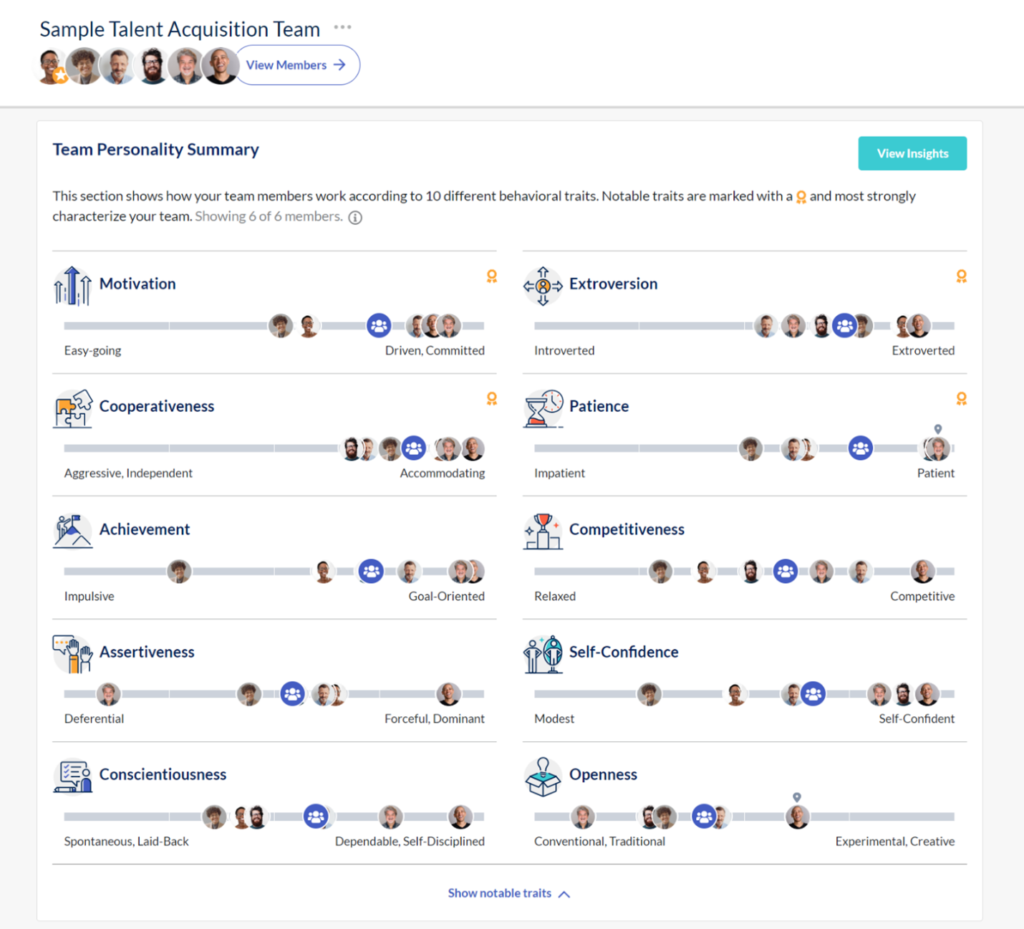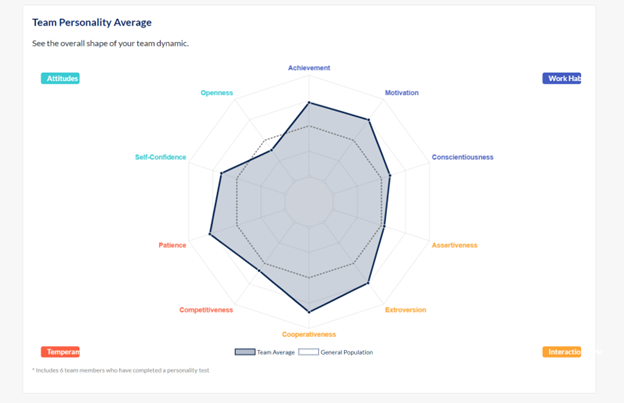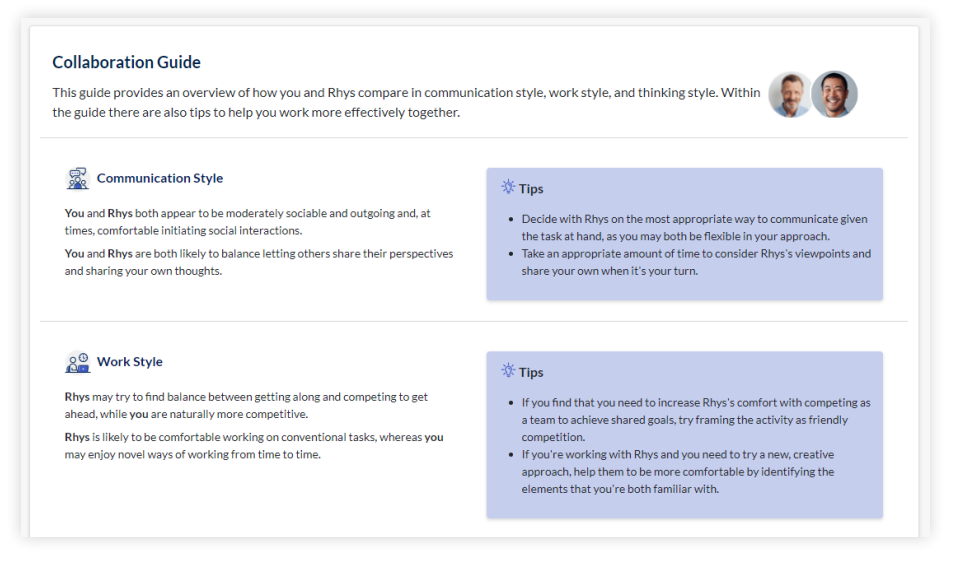It’s no secret that using assessments during your hiring process can yield a higher quality of hire. But what about after you’ve brought that new employee into the fold? Turns out, using certain types of assessments post- hire can have a lasting impact on your business too. These assessments can have a positive effect on team building, lead to better employee management, and even increase talent mobility within your organization. Let’s dive in and learn more about the value of post-hire assessments for your business – whether you’re actively hiring or not!
Post-Hire Assessments for Team Cohesion
What qualities create highly effective and efficient team dynamics? The main underpinnings of a successful team are communication, clear objectives, and mutual trust. Usually, understanding how each individual operates – their preferred methods of communication, motivators, strengths, and weaknesses – takes a while for managers to parse out and fully appreciate.
Assessments that focus on personality and workplace preferences can help team leaders better understand how to effectively motivate and manage their teams. Simultaneously, understanding how your employees work allows you to foster an environment that brings out the best in them.
Criteria created Talent Insights to enable teams to thrive by assessing 10 key behavioral traits. Simply build out your team in the Criteria platform and invite each member to take a short personality test. Once employees have finished the assessment, you’ll be able to see a high-level view of your team’s traits. The value of this post-hire assessment lies in its ability to empower teams by improving collaboration and communication.

Talent Insights also provides a snapshot of your team’s average personality, which informs a personalized Collaboration Guide that Criteria generates based on the key traits your team exhibits.

Gaining such a robust understanding of your team’s underlying dynamics is made incredibly easy with post-hire assessments. Additionally, you’re able to add in new potential team members to see how they could fill potential skill gaps on your team or how well they will integrate. This style of post-hire assessment empowers your organization to build and manage highly effective teams.
Improving Manager-Employee Relationships with Post-Hire Assessments
Similar to how post-hire assessments can help you understand team dynamics, they can also develop stronger one-on-one management of direct reports. Personality assessments administered after hiring (or when a current employee moves under a new manager) can help grease the wheels of their relationship.
Managers can use information gathered from assessments like Criteria’s Workplace Insights Report to get an idea of each employee’s preferred communication methods, thinking style, key personality traits, strong suits, and areas for improvement. The goal is to accelerate the depth and pace of rapport building within workplace relationships.

Criteria provides managerial guides on an individual level to help direct meaningful conversations around employee development and comfort in their current role.
Research shows that for the most part, employees don’t leave companies – they leave managers. According to a survey of 3000 workers, 82% of people would consider quitting a job because of a bad manager. One value of post-hire assessments is that they enable managers to engage more effectively with their reports.
When employees feel heard, trusted, and connected to their managers, they are less likely to go off in search of greener pastures. Employees that have a solid relationship with their managers and co-workers are more engaged in their work and report higher levels of job satisfaction. Using assessments to learn more about each of your employees (and then acting accordingly) helps you to facilitate a healthy work environment where your workers succeed. And when your workers are thriving, so is your bottom line.
Using Post-Hire Assessments to Drive Internal Mobility
Internal mobility is a hot topic right now, with its ability to reduce hiring burden, decrease turnover, lengthen your employee lifecycle, and improve worker morale and commitment to your organization. But moving your employees from one role to another must be done thoughtfully to avoid fallout.
Having a defined talent mobility program is a great way to make sure internal moves within your organization go smoothly. But moving a star employee from a role where they are a strong performer can be daunting. How can you know if they will be just as stellar in their new position? Using post-hire assessments is one way to confirm that workers have the capability to succeed in another role within your business.
When you’re considering filling a role internally, it’s important that the current employee goes through the same process as your external candidates. Having your them take the same assessments as other candidates, go through the same interview rounds, and follow the same hiring process is vital for fair and equitable hiring. In addition to the legal insulation this provides, having your current employee take assessments reassures you that they have the core competencies needed to succeed in a different role.
Just like pre-hire assessments can help you identify the strongest talent in your candidate pool, post-hire assessments can help you determine which of your current employees have the potential to succeed in other parts of your business. Add an additional layer of certainty with personality or competency testing, and your confidence that they will be comfortable and satisfied in a different role within your organization gets boosted even further.
Assessments For All Stages of the Employee Lifecycle
Whether you’re looking improve team dynamics, foster more meaningful workplace relationships, or build out your own internal mobility program, post-hire assessments are powerful tools that are up for the challenge. Using personality assessments post-hire can help you to better understand how to most effectively manage and engage with every employee on your team. Other assessments, like competency, cognitive, or skills tests, can provide reassurance that a candidate has the capacity to succeed in a different role at your organization.
Even if you’re not actively hiring new recruits for your business, using post-hire assessments will allow you to make the most of your current workforce. Using assessments like Criteria’s can enable you to create a positive work environment that fosters collaboration and fulfillment for all of your employees.




